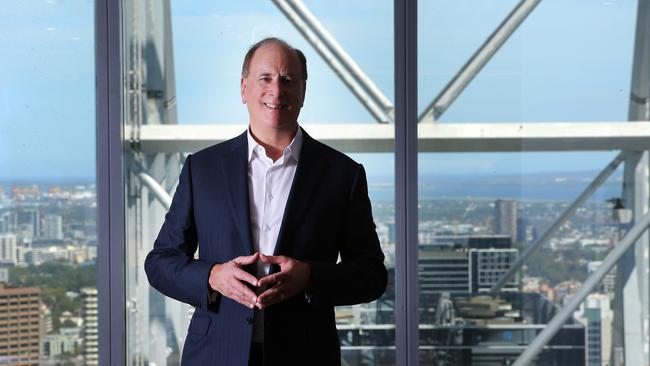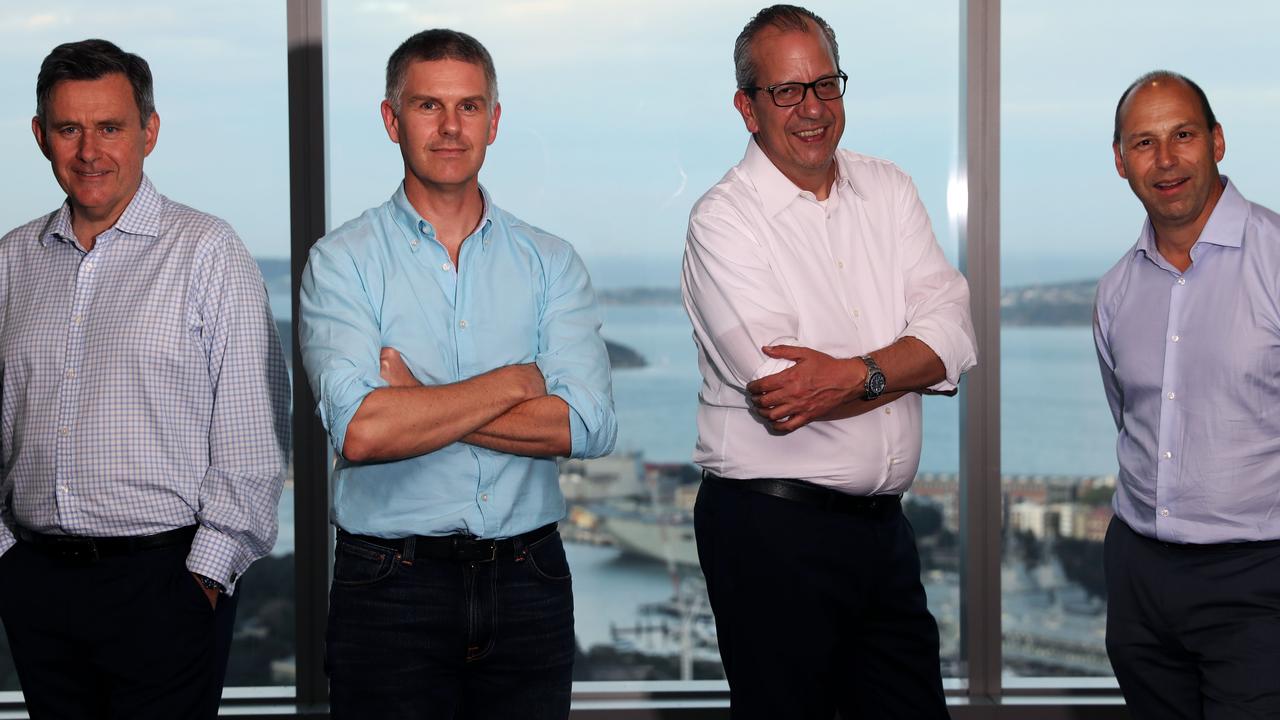BlackRock boss Larry Fink rules out selling shares in ‘foresighted’ carbon intensive companies across oil and gas
The world’s biggest money manager, with stakes in Woodside Petroleum and Whitehaven Coal, will keep shares in ‘foresighted' carbon-intensive companies with ‘phoenixes’ potential.

The world’s largest asset manager, the $US10 trillion BlackRock, has ruled out selling shares in carbon intensive companies such as those in oil and gas, arguing that they have the potential to be “phoenixes” by transitioning to a net zero world.
The group’s Australian company investments includes a 5.92 per cent stake in gas giant Woodside Petroleum, valued around $1.44bn. Plus, a 1.5 per cent stake in coal mining giant Whitehaven Coal worth about $45.2m.
“BlackRock does not pursue divestment from oil and gas companies as a policy,” New York-based BlackRock chair and chief executive Larry Fink says in his latest annual letter to the CEOs of the companies his fund invests in released on Tuesday.
“Divesting from entire sectors – or simply passing carbon intensive assets from public markets to private markets – will not get the world to net zero.”
Mr Fink said “foresighted companies across a wide range of carbon intensive sectors” were transforming their businesses to reduce their carbon output.
“Their actions are a vital part of decarbonisation,” he said.
“We believe companies leading the transition present a vital investment opportunity for our clients.
“Driving capital towards these phoenixes will be essential to achieving a net zero world.”
Mr Fink’s latest letter does not mention the more sensitive area of coal, where BlackRock has been selling down its stakes in companies but continues to be a significant investor.
BlackRock has been under pressure from climate change activists to take a more aggressive attitude to selling down its stocks in fossil fuel industries.
Mr Fink promised to sell most of BlackRock’s shares in coal companies in his letter to clients two years ago.
External estimates last year were that the fund manager still holds some $US85bn ($117.70bn) in coal companies around the world.
BlackRock – which offers both active and passive or indexed investment options – has completely sold out of all companies that generate more than 25 per cent of revenue from thermal coal from its active investment strategies.
The group also offers clients the choice to exclude coal from its index products.
But the group said that some of its index funds may continue to hold shares in certain fossil fuel companies “because index funds are designed to track the investment results of third party indexes.”
BlackRock said it did not have the discretion to sell out of certain companies in its index strategies, but it did offer clients a choice “through the industry’s largest ESG index offering.”
Mr Fink said the change to net zero carbon emissions would “not happen overnight.”
“We need to pass through shades of brown to shades of green.”
Mr Fink said that “bold incumbents” in carbon emitting industries could be part of the transition to a net zero world.
But he warns that “governments and companies must ensure that people continue to have access to reliable and affordable energy.”
Mr Fink said there had been a “tectonic shift of capital” in the two years that he had written in his 2020 letter to CEOs that climate change risk was an investment risk.
“Sustainable investments have now reached $US4 trillion,” he said.
“This is just the beginning. Whether it is capital being deployed in new ventures focused on energy innovation, or capital transferring from traditional indexes into more customised portfolios and products, we will see more money in motion.”
Mr Fink singled out the changing world of work as another key theme of his letter, noting that employees were now increasingly looking to their employers as the most trusted source of information in the wake of the Covid-19 pandemic.
He said CEOs were now under more pressure to put forward a clear purpose and consistent strategy for their company, as employees now trusted their employer for sources of information more than the government, the media and NGOs.
“It has never been more essential for CEOs to have a consistent voice, a clear purpose, and a coherent strategy and a long-term view,” he said.
Mr Fink said the pandemic had changed the relationship between employee and employer with resignation rates in the US and the UK at historically high levels.
“Employees across the globe are looking for more from their employer, including more flexibility and more meaningful work.”
Mr Fink said research had shown that companies which forged strong bonds with their employees have seen lower levels of turnover and higher rates of return through the pandemic.
“Companies not adjusting to this new reality and responding to their workers do so at their own peril.”
“Turnover drives up expenses, drives down productivity and erodes culture and corporate memory,” he said.
“CEOs need to be asking themselves whether they are creating an environment which helps them compete for talent.”
BlackRock CEO for Australia, Andrew Landman, said some employees now were exercising the opportunity to “opt out” of their current jobs and thinking about career changes.
“A lot of people have made these decisions during the pandemic.”
Mr Landman said there were challenges for employers in continuing to maintain an atmosphere of collaboration in the workforce when most of the staff were working from home.
“How do we ensure that staff feel they are in an inclusive environment if they are not in the office five days a week?”
He said there were also new obligations on employers including ensuring that their staff working from home were working safely.
Mr Fink said the world had seen an “explosion” in the availability of capital with total financial assets in the world today of some $US400 trillion.
He said this meant that banks were no longer the “gatekeepers to funding” with plenty of capital available for investment in new companies.
“Young, innovative companies have never had easier access to capital,” he said.
“Never had there been more money available for new ideas to become a reality.”
Mr Fink said the easy availability of capital was “fuelling a dynamic landscape of innovation”.
He said this meant there were waves of start ups and new entrants which would be challenging the business model of large established companies.
“Virtually every sector has an abundance of disruptive start ups trying to topple market leaders.”
“CEOs of established companies need to understand this changing landscape and the diversity of available capital if they want to stay competitive in the face of smaller, more nimble businesses.”



